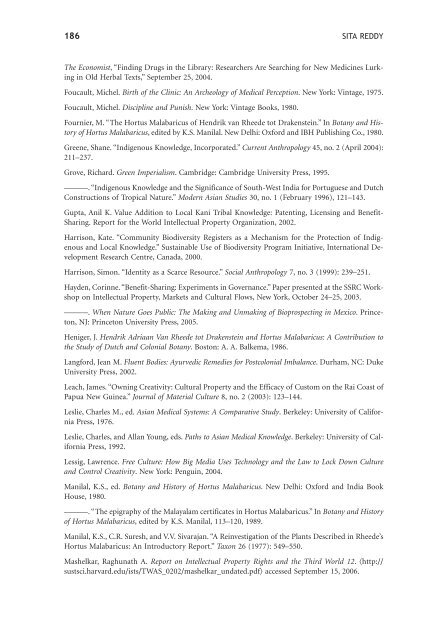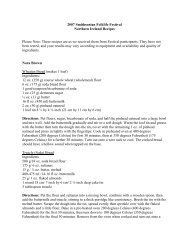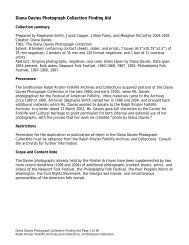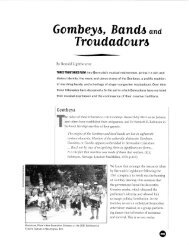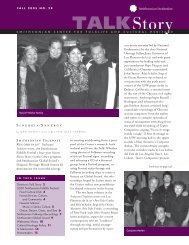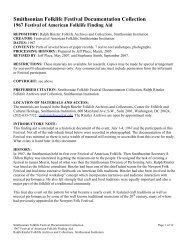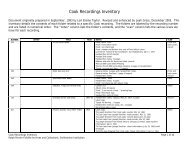Who Owns Traditional Medical Knowledge? - Smithsonian Center ...
Who Owns Traditional Medical Knowledge? - Smithsonian Center ...
Who Owns Traditional Medical Knowledge? - Smithsonian Center ...
You also want an ePaper? Increase the reach of your titles
YUMPU automatically turns print PDFs into web optimized ePapers that Google loves.
186 SITA REDDY<br />
The Economist, “Finding Drugs in the Library: Researchers Are Searching for New Medicines Lurking<br />
in Old Herbal Texts,” September 25, 2004.<br />
Foucault, Michel. Birth of the Clinic: An Archeology of <strong>Medical</strong> Perception. New York: Vintage, 1975.<br />
Foucault, Michel. Discipline and Punish. New York: Vintage Books, 1980.<br />
Fournier, M. “The Hortus Malabaricus of Hendrik van Rheede tot Drakenstein.” In Botany and History<br />
of Hortus Malabaricus, edited by K.S. Manilal. New Delhi: Oxford and IBH Publishing Co., 1980.<br />
Greene, Shane. “Indigenous <strong>Knowledge</strong>, Incorporated.” Current Anthropology 45, no. 2 (April 2004):<br />
211–237.<br />
Grove, Richard. Green Imperialism. Cambridge: Cambridge University Press, 1995.<br />
———. “Indigenous <strong>Knowledge</strong> and the Significance of South-West India for Portuguese and Dutch<br />
Constructions of Tropical Nature.” Modern Asian Studies 30, no. 1 (February 1996), 121–143.<br />
Gupta, Anil K. Value Addition to Local Kani Tribal <strong>Knowledge</strong>: Patenting, Licensing and Benefit-<br />
Sharing. Report for the World Intellectual Property Organization, 2002.<br />
Harrison, Kate. “Community Biodiversity Registers as a Mechanism for the Protection of Indigenous<br />
and Local <strong>Knowledge</strong>.” Sustainable Use of Biodiversity Program Initiative, International Development<br />
Research Centre, Canada, 2000.<br />
Harrison, Simon. “Identity as a Scarce Resource.” Social Anthropology 7, no. 3 (1999): 239–251.<br />
Hayden, Corinne. “Benefit-Sharing: Experiments in Governance.” Paper presented at the SSRC Workshop<br />
on Intellectual Property, Markets and Cultural Flows, New York, October 24–25, 2003.<br />
———. When Nature Goes Public: The Making and Unmaking of Bioprospecting in Mexico. Princeton,<br />
NJ: Princeton University Press, 2005.<br />
Heniger, J. Hendrik Adriaan Van Rheede tot Drakenstein and Hortus Malabaricus: A Contribution to<br />
the Study of Dutch and Colonial Botany. Boston: A. A. Balkema, 1986.<br />
Langford, Jean M. Fluent Bodies: Ayurvedic Remedies for Postcolonial Imbalance. Durham, NC: Duke<br />
University Press, 2002.<br />
Leach, James. “Owning Creativity: Cultural Property and the Efficacy of Custom on the Rai Coast of<br />
Papua New Guinea.” Journal of Material Culture 8, no. 2 (2003): 123–144.<br />
Leslie, Charles M., ed. Asian <strong>Medical</strong> Systems: A Comparative Study. Berkeley: University of California<br />
Press, 1976.<br />
Leslie, Charles, and Allan Young, eds. Paths to Asian <strong>Medical</strong> <strong>Knowledge</strong>. Berkeley: University of California<br />
Press, 1992.<br />
Lessig, Lawrence. Free Culture: How Big Media Uses Technology and the Law to Lock Down Culture<br />
and Control Creativity. New York: Penguin, 2004.<br />
Manilal, K.S., ed. Botany and History of Hortus Malabaricus. New Delhi: Oxford and India Book<br />
House, 1980.<br />
———. “The epigraphy of the Malayalam certificates in Hortus Malabaricus.” In Botany and History<br />
of Hortus Malabaricus, edited by K.S. Manilal, 113–120, 1989.<br />
Manilal, K.S., C.R. Suresh, and V.V. Sivarajan. “A Reinvestigation of the Plants Described in Rheede’s<br />
Hortus Malabaricus: An Introductory Report.” Taxon 26 (1977): 549–550.<br />
Mashelkar, Raghunath A. Report on Intellectual Property Rights and the Third World 12. http://<br />
sustsci.harvard.edu/ists/TWAS_0202/mashelkar_undated.pdf accessed September 15, 2006.


